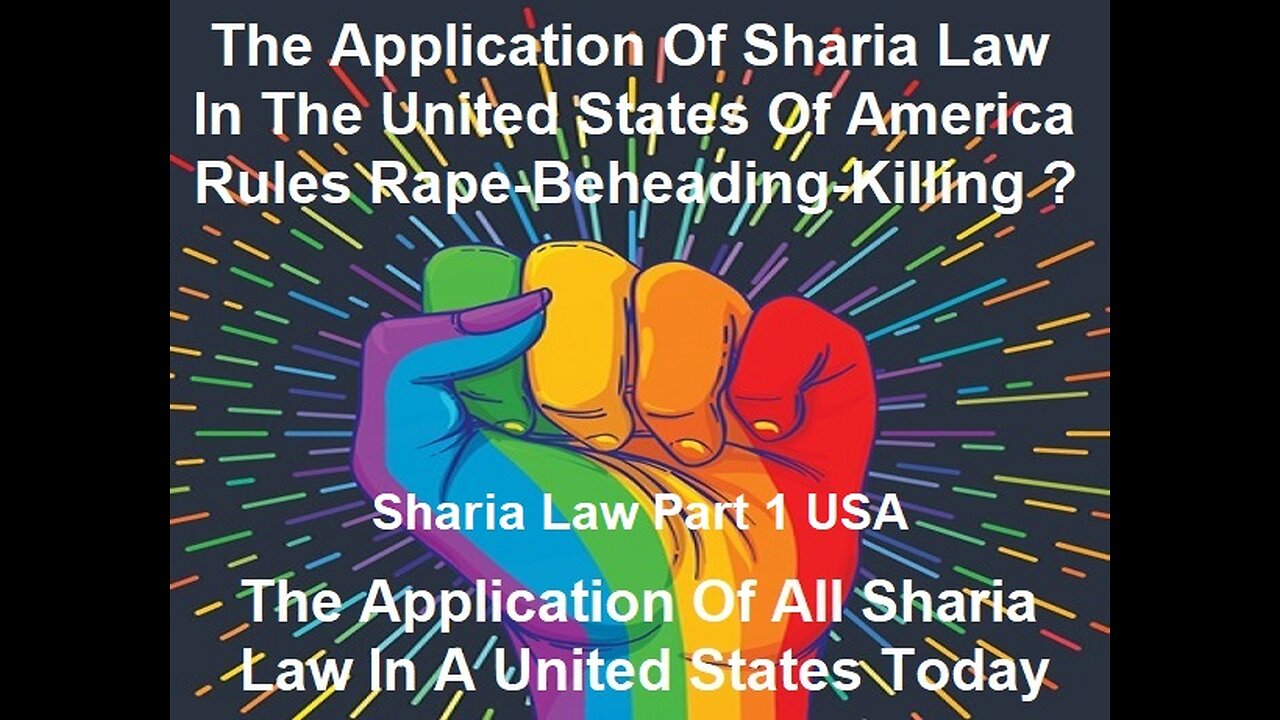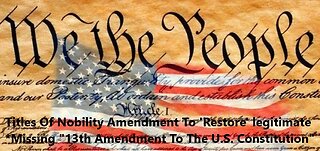Premium Only Content

Sharia Law In The USA And The Application Of All Sharia Law In United States Today
Sharia Law In The USA Part One The Taliban want to impose their version of the Sharia Law in Afghanistan. What is the Sharia? Why is it controversial? Why are Sharia laws different in different countries? Palki Sharma explains the history, interpretations & debates over the Sharia. This article is written by and from the Sathyabama Institute of Science and Technology. This article discusses Sharia law in the United States, including an outline of the law and its history. The article also discusses all aspects of Sharia Law in the United States as well as the anti-Sharia movement. This Is Part One Text Below... Thanks !
Introduction
The term Sharia derives from the Quran, the Islamic sacred book, as well as the Sunnah and Hadith, Prophet Muhammad’s deeds as well as his preachings. This is taken from the legal system of Islam. “Where an answer cannot be obtained immediately from these, religious experts may provide decisions as guidance on a specific topic or question,” according to the Sharia. This literally means ‘clean, well-trodden way to water’ in Arabic. This serves as a rule of conduct for all Muslims, including prayers, fasting, and charitable works for the needy.
Download Now
Sharia law is a religious law that establishes regulating principles for spiritual, mental and physical behaviour that Muslims must obey. This is considered God’s command for Muslims since it is important in Islam’s legal system. This law primarily assists Muslims in understanding how they should spend their entire lives in accordance with God’s commands. Sharia may have an effect on every element of a Muslim’s everyday life. Various states in the United States of America have prohibited Sharia law or prevent state courts from considering foreign international or religious law.
Sharia is a methodology through which Muslims look for divine intent in their sacred books, not simply a set of laws to follow. It includes everything from how a faithful Muslim should eat, to how animals and the environment should be treated, to business practices and marriage customs. It is the Islamic code of morality system that governs every element of a Muslim’s life. Sharia law is not in effect or no longer in force in the United States since it has not been legally enacted as a body of law.
Let’s take a wider look at Sharia law.
What is Sharia Law
Sharia is derived from an Arabic word that means ‘path to the water,’ representing the concept that Sharia is divine guidance drawn primarily from the Quran and Sunnah, which their Prophet Muhammad’s teachings and guidance for the goal of helping humanity in bringing close to God and living in kindness and justice with his creation. Muslims use the term Sharia to refer to the values, code of behaviour, and religious precepts or holy rules that help them find guidance in different parts of life. While Sharia is frequently translated as ‘Islamic law,’ a more precise phrase for ‘Islamic law’ in Arabic is ‘fiqh’, which refers to the nature of humanity to interpret and implement Sharia. Many people believed that Sharia was a substitute for the law of the country, and this is where the trouble begins with Sharia law. Sharia law must be limited to a specific way of life. Sharia law, in general, addresses both personal and community elements of life. Any faithful Muslim would regard himself or herself to be a Sharia follower.
Sources of Sharia Law
The Sharia law is derived from the following basic sources:
Quran
The Quran is Islam’s holy book that contains Allah’s messages, which are global and everlasting in nature, as delivered by the Prophet. The main source of Sharia, the Islamic book of the law, is the Quran. It is made up of the laws which govern the Muslim world and serves as the foundation for relationships between Muslims and non-Muslims, as well as between humans and other members of creation. Sharia law is based on the Quran, and it is essential that all of its specific provisions are strictly followed. The Sunnah and Hadith, which include the Prophet’s words and deeds, are the sources that support the Quran.
Hadith
The Hadith or story of the Prophet’s Sunnah constitutes the Muslim community’s religious standards which is the saying of Prophet Mohammad. Hadith clarifies and eliminates the ambiguity in the Quran. Muslims can only understand how to fast, pray, and perform pilgrimage according to Quranic instructions with the aid of Hadith. It is regarded and recognised as the principal source of strict laws and moral standards following the Quran. It is a record of the prophet Mohammed’s customs and habits. Without the aid of Hadith, the Quran has no significance. Muhammad Ibn Ismail al-Bukhr was the source author of Hadith.
Ijma
The Ijma includes the legal opinions of Islam’s educated scholars. Ijma, also known as the universal and permanent agreement of the Muslim community at large or a specific Muslim scholar, is an Arabic term used in Islamic law. In Arabic, the word Ijma means ‘consensus’, and it is occasionally supported by a Hadith the sayings and deeds of Muhammad from his traditions. Therefore, it belongs to traditional authority.
There are three different types of Ijma:
Ijma of companions: The unanimous opinion of the Prophet’s companions was regarded as the most trustworthy, which means it cannot be overturned or amended.
Ijma of jurists: The unanimous opinion of the jurists, who were not companions.
Ijma of the people or masses: The majority opinion of Muslims was considered as the law.
Qiyas
The Qiyas is the method of reviewing complex doctrine problems to situations decided by the authority of the Holy Book and Sunnah. It is the Sharia part of Islamic law known as qiyas that is subject to change in accordance with the needs and demands of the times. This feature of Islamic law gives it a wide range of possibilities for development and improvement. The principle of analogy, which is analogical inference or deduction, is used in the interpretation of aspects of Islamic law that are not expressly covered in the Quran or the Sunna. These interpretations involve comparing and contrasting the teachings of the hadith with those of the Quran.
Sunnah
The Sunnah is the deeds of Prophet Mohammad. The body of the Islamic community’s ancient social and legal customs and practices is known as the Sunnah. Sunnah is another essential source of Sharia, or Islamic law, along with other sources like the Quran and Hadith. The term Sunnah refers to precedents established by tribal ancestors that were followed by everyone in the society and recognised as normal. It also refers to the path of the Prophet Muhammad, may Allah grant peace and blessings to all. Islamic law is derived from the Quran and Sunnah. Additionally, this provides more guidelines and rules.
Schools of Sharia Law
Sharia laws are divided into five schools of thought:
Hanbali [Founder: Ahmad Ibn Hanbal]
One of Islam’s four Sunni schools of religious law, the Hanbali School is best recognised for its part in the standardisation of early theological doctrine. Ahmad Ibn Hanbal was its founder. The authority of the Hadith and the precedents established by the earliest Muslim generations is emphasised by this school.
Maliki [Founder: Malik Ibn Anas]
The Maliki school was founded by Malik Ibn Anas and is one of the four Sunni law schools. In order to understand the implications in view of the Quran and Hadith law, this school concentrated on local community practices among Muslims. In order to guarantee favourable legal outcomes, this school also encouraged the use of analogical reasoning and exercised juristic discretion.
Shafi’i [Founder: Muhammad Ibn Idris Ash-Shafi’i]
Muhammad Ibn Idris Ash-Shafi’i was the person who founded the Shafi’i school. Additionally, this is one of the four Sunni schools of law. This is an affirmation of the legitimacy of both divine law-giving and legal speculation on the part of humans. The consensus of scholars or the Ijma community was acknowledged but not emphasised.
Hanafi [Founder: Abu Hanifa an-nu’man]
One of the four main schools of Sunni Islamic legal theory and a source of positive law is the Hanafi School. This has to do with an established school of Sunni jurisprudence, particularly in southern and central Asia. Abu Hanifa an-nu’man was the person who founded the Hanafi School.
The four mentioned above are Sunni Muslims. The final one is Shia Islam, which is a version of Sharia law known as Ja’fari.
Five goals of Sharia Law
The Sharia’s five major goals are:
Protection of sound religious practice life: Sharia law governs Muslim’s personal religious practices globally, but it should have an impact on modern legal systems.
Life: Muslims follow the path of divine guidance under the Sharia law in order to live moral lives and get closer to God. It establishes principles for spiritual, mental and physical behaviour that Muslims must follow.
Sanity: In Sharia law, a sane person is an individual who has enough mental ability to distinguish between good and evil, profit and loss. A person is released from their religious obligations when their capacity for thought and discernment is impaired. This is also a goal for Sharia law to attain.
Family: According to Sharia law, family life is a vital part of the human community, providing a safe, healthy, and caring environment for parents and their developing children.
Personal and communal wealth: Sharia law seeks to achieve this goal in areas such as marriage, divorce, inheritance, and family relations under personal laws. Sharia law also aims to satisfy the goal that all property belongs to God and is only temporarily enjoyed by humans. Property inheritance is essentially communal wealth, and the law states that wealth belongs to no one in the source of the Quran. People have the right to own and protect their property.
According to all Islamic schools of law, one of the five basic maxims of Sharia is the acknowledgement of sound local customs across the world.
What are the laws under Sharia
The norms of religious law are covered under Sharia law. These norms form the framework for Muslim citizens’ daily conduct. The Sharia laws are the religious laws of Islam, which are believed to represent God’s instructions to Muslims. When they are put into effect, they form a system of obligations that all Muslims are supposed to perform as a result of their religious conviction. The following are the various laws that cover Sharia law:
Penal law:
The criminal receives the same treatment as the victim for all crimes against another person under Sharia law, including murder and assault, which are punished by retribution. This is also covered under penal law.
Family law:
Sharia law, which forms the foundation of customary Islamic law governing family interactions, is also covered under family law. An adult woman may enter into her own marriage contract under Hanafi and Shi’i law, but if the lady marries someone who is lower socially than her, the guardian may have the marriage annulled.
Succession law:
An individual’s ability to make a legacy is essentially constrained to one-third of the value of their inheritance when it comes to Sharia law under the law of succession.
Procedure and evidence
Law was governed by a single qadi who presided over a court and served as both the fact-finder and the law’s judge. Still, he occasionally sought the counsel of a jurisconsult, a qualified lawyer. The qadi’s first responsibility was to determine who had the burden of proof. In both criminal and civil proceedings, the level of proof needed, whether on an initial, intermediate, or final issue, was strict and essentially the same. Naturally, within the course of a single lawsuit, the burden of evidence may alternate between the parties. The plaintiff or prosecution was needed to provide two witnesses to testify verbally to their direct knowledge of the truth of his claim in the absence of a confession or an admission by the defendant. Moreover, two mature Muslims with a reputation for morality and character were often required to provide oral evidence. However, the testimony of women was accepted, and in the majority of property claims, the plaintiff could meet the burden of evidence by calling only one witness and swearing solemnly to the validity of his claim. Any witness evidence might be used to assist Qadi in making the right choice.
Sharia law in the USA
The U.S. Constitution is the foundation of American democracy. Religious freedom, privacy, and private property are all protected under the Constitution. People can pursue their conscience in terms of culture, conduct, and lifestyle as long as they respect others’ rights and their activities are in accordance with the basic good, according to the Constitution. Muslims must follow Sharia in the same manner that members of other religions adhere to their holy laws and traditions in the United States.
The religious provisions of the First Amendment to the United States Constitution allow for total freedom of belief and religious practice as long as followers respect the rights of other religions. The American way, as embodied in the first amendment’s religion clauses, promotes religious freedom and religious practice. It permits religious and secular organisations to practice whichever way they like as long as it is free and they respect others’ rights. There have always been various religious organisations in America that follow their own holy rules and lifestyles, such as Catholics, Jews, Baptists, Amish, Buddhists, Quakers, Religious communes, and so on.
In a similar way to Catholics who follow the teachings of the church or Jews who follow Halakhah, American Muslims follow Sharia on a free, separate basis. Daily prayers, fasting throughout the month of Ramadan, marriage contracts, and laws for charity and investing are all important aspects of Sharia. Muslims must abide by these customs without infringing on the rights of others. Because Muslims make up 1 to 2% of the American population, there is a risk that Sharia law will be used instead of US law in American courts. However, there is no proof that this is happening or even being considered. A group of leading security policy researchers produced elaborate research in 2010 concerned with the greatest authoritarian threat of the time, which is the legal political-military ideology known under Islam as Shariah. Sharia requires Muslims to follow the laws of the land in which they reside.
How does Sharia Law apply in America
The applicability of Sharia law in the USA has been made from a case where a Moroccan man and his 17-year-old wife immigrated to America. The wife obtained a restraining order against her husband, reporting that he was raping her. The husband did not deny that their sexual interactions were consenting, but he stated that under his religion, the woman was expected to submit and do everything he demanded from her. The New Jersey judge determined that, based on his knowledge of Islam, he had no intention to commit a crime and was thus innocent. The restraining order was refused. The US Court of Appeals noted that the Judge in the New Jersey case committed a legal error, which was overturned by a higher court that granted a restraining order.
His explanation was really helpful on this controversial and sensitive subject. The American judicial system has the following lists of permitted and prohibited conduct:
Application of inheritance based on Sharia law:
The application of inheritance based on religious motivation is permitted. However, asking the court to split inheritance based on Sharia law is not allowed. Contracts and property dispositions are free under US law. One person shall split one’s property in a will according to preference or request that it be divided according to Sharia law by a religious scholar. However, the court does not accept it has the authority to interpret religious laws and would decline a request to do so.
Application of foreign laws:
To determine a marriage or injuries caused overseas, it is permissible to apply foreign law. However, it is not permissible in other situations when doing so would violate US law or would subject a witness to unfair trial procedures. If two foreigners were legally wedded in accordance with the law of the nation from which they immigrated, US law would recognise that marriage. The determination of marriage in a domestic dispute by US courts must take into account international countries where marriage is governed by Shariah. However, polygamy’s acceptability abroad has no legal standing in US courts. Tort laws are governed by the country in which the harm occurred if an American gets hurt abroad and sues a firm that has a place in the US.
The religious exemptions from employment:
Religious exemptions from employment regulations are permissible, but only if they don’t put an undue burden on the business or go against the government’s interests. According to case-by-case analysis, US law enables reasonable adjustments for religious beliefs. Accordingly, depending on the nature of the employment is in issue, wearing a hijab at work or taking time out of the workday to pray may or may not be permitted. It is crucial to note that a famous decision that permits Muslim taxi drivers to refuse a customer carrying alcohol was based on American precedent rather than on an understanding of what is permissible under Islamic Sharia law.
Granting accommodation:
It is permissible to provide accommodation to students or clients that incur only modest costs for the institution. It is not permitted to assess these petitions based on the religious group making the request. As long as doing so does not harm the public interest as a whole, US law permits public and commercial entities to better serve their residents and customers by appealing to their religious beliefs. For example, banks are providing Sharia-compliant loans and high-density Muslim institutions give all kids a full day off on holidays rather than just excluding them. Examples of this nature are applicable to all religious petitioners equally, and they should not be evaluated according to religious benefits.
To legislate Islamic morality:
In highly populated Muslim communities, attempts to legislate Islamic morals are permitted unless they violate the equal protection clause or the free speech code. Citizens may lobby the government to pass morally consistent policies under US law. Therefore, Muslims have the same freedom as everyone else to adopt municipal laws that, for example, forbid the consumption of alcohol.
Prevention of Sharia Law:
There are ten states that forbid the application of foreign law in their state courts, which is another way they have attempted to ban Sharia and no one seems to discriminate against Muslims. Alabama, Arkansas, Arizona, Louisiana, Kansas, Mississippi, North Carolina, Oklahoma, South Dakota, and Tennessee are among these states.
Impact of Sharia Law on the U.S. Constitution
American laws are based on a set of values and principles that are outlined in the U.S. Constitution. The American legal system must be the foundation of the Constitution. Sharia, in a similar manner, reflects the principles that must support Islamic law. On the question of whether the law of their country should be influenced by the Quran, Muslims participated in certain protests and rallies. However, there have been attempts by Muslims to create legislation defending a Muslim’s right to follow traditional Islamic law regarding marital disputes, divorce, and other family-related matters. More significantly, when it comes to trade and treaties, US courts consider international law, including foreign laws like Islamic law.
Muslims in America frequently support liberal political causes while simultaneously adhering to conservative views and beliefs. However, many American Muslims also support more conservative ideals, such as:
By supporting their school vouchers,
Government funding for religious social service organisations,
Restrictions on abortion,
The death penalty,
Tax reductions,
Mandates that Americans speak English, and
Even stricter measures to combat terrorism.
Sharia is included in the majority of Muslim-dominated governments’ constitutions; nevertheless, family law is the only area where its principles are still generally upheld. If the US passed a constitutional amendment prohibiting sharia, it would be the same as prohibiting Americans. Muslims should oppose the implementation of justice and human rights. The majority of American Muslims accept the U.S. Constitution and do not support Sharia or Islamic law taking its place. All American citizens are granted these liberties and privileges by the nature of the United States Constitution.
Does Sharia Law supersede the U.S. Constitution?
There were US citizens who favoured Sharia law over the Constitution because they find it to be more respectable and dignified and because it is the law of God. However, the U.S. Constitution was drafted by humans, not by the people who would eventually live under it. Since the US has a Constitution that guarantees freedom of expression and of religion, some people oppose substituting it with Sharia law. Additionally, they make the argument that people of all religions, including Christians, Jews, and others, are free to practice their religion in their own way anywhere in the nation.
Many permissible interpretations of Islamic law, as well as ones that could mislead one, according to Muslim scholars. Some interpretations of the Islamic law that are much more severe and intolerant than others have only recently emerged. According to more extreme interpretations, there is only one collection of Sharia laws, and only those who abide by them will be saved by God. This is the path of discrimination, opposition to democracy and the advancement of Muslims over all other religions. The interpretation of Islamic law in the United States does not contradict American law even if it does not give instructions on crime and punishment.
Can American courts substitute religious law under civil law
According to the First Amendment’s Establishment and Free Excercise Clauses of the United States Constitution, everyone in the United States has the right to practice his or her own religion or no religion at all. The government cannot punish an individual or a group of people because of their religious beliefs. When issues over the laws of different religious traditions have occasionally found their way into civil courts in the United States, the Supreme Court has consistently decided that judges and other government officials may not interpret religious doctrine or rule on theological concerns. The United States Constitution says that Congress shall make no law respecting an establishment of religion or prohibiting its free practice. The prohibition applies equally to all religious groups.
What are the fears of Sharia Law in America that will grow among conservatives
Strict Islamic law is known as Sharia. It is intended to direct pious Muslims in their interpersonal and professional interactions. The Taliban and others have used it to defend restrictions on women’s rights and severe penalties, such as amputation and stoning. The issue surrounding the Islamic Cultural Center, just two blocks from the scene of the September 11 attacks, has been directly linked to the protests against Sharia law. The legal system in the United States is comparable to that of Great Britain, where courts are willing to uphold agreements reached in accordance with Jewish, Christian, or Islamic law and reached by religious tribunals, within reasonable bounds. However, there are 2 million Muslims living in the United States, a nation with a population of over 310 million people.
Background of the anti-Sharia movement
In June 2018, anti-Sharia rallies organised by ACT for America were conducted around the United States, attracting white nationalists, armed right-wing militias, and even neo-Nazis. The American Laws for American Courts model legislation, which can be found on the American Public Policy Alliance’s (APPA) website, is used in the bulk of anti-Sharia laws presented across the US. David Yerushalmi, a lawyer who makes statements regarding race, immigration, and Islamic law, was the leading force behind the anti-Sharia movement. He has started to have considerable influence in the American public discourse on Shariah.
The anti-Sharia movement is a part of a bigger, organised network-sponsored islamophobic campaign. Various initiatives taken to pass anti-Muslim laws at the state level have been unsuccessful, making Muslims and their faith targets as well. According to a report by the Center for American Progress, Yerushalmi wrote the sample anti-Sharia law that would make adhering to the Islamic law a crime that is punished by 20 years in prison. To persecute Muslims and create fear about the false threat of Sharia law, anti-Sharia law was employed in state legislatures across the country.
Anti-Sharia laws are now up for a legal challenge in accordance with the United States Constitution, both for potential interference with the important function of the courts and for the possibility of First Amendment rights to freedom of religion violations. Here, to extent that anti-Sharia legislation seeks to ban the application of Sharia for any reason at all in interpreting legal relations, it might be seen as an effort to obstruct the practice of Islam.
However, some people have developed a strong objection to Sharia law due to their fear of its impact on Islam. It is ridiculous to believe that banning Sharia law is the sole and most effective way to stop Americans from stoning adulterous women on public streets. There are certain negative impacts of Sharia law on the American legal system. Marriages, divorces, custody disputes, inheritance laws, and many other issues regularly come before the courts in this country at the crossroads of international affairs to have the provisions of laws and contractual agreements created under the laws of other countries interpreted. The courts are unable to carry out their duties properly as a result of the adoption of anti-Sharia laws.
Statistics of the anti-Sharia movement In the United States, the anti-Sharia bill was introduced and enacted in many states. Since 2010, 201 anti-Sharia law bills have been introduced in 43 states. In 2017, 14 states introduced an anti-Sharia law bill, with Texas and Arkansas enacting it.
Conclusion
Muslims in the USA are now required to uphold their religious morals in accordance with Sharia law, just as other religions are free to do the same. An individual cannot be forced to accept or implement any Sharia law as a legislative requirement. Just as other religions follow their own moral and holy laws, Muslims can live their private lives in accordance with Sharia. But in 2017, Muslims in America felt like their religious community was being discriminated against. However, the majority of Muslims are able to exercise their religion freely because of a guarantee given by the US Constitution. The First Amendment’s religion clause, which upholds the freedom of religion and religious practice, is a testament to the American way. Sharia law is based on a voluntary, private basis.
FAQs
What does Sharia Law actually entail?
Muslims should follow Sharia as their preferred form of divine instruction in order to live moral lives. Islamic law today is based on human interpretations of Sharia or fiqh.
Are all religious individuals and groups protected by the First Amendment to the U.S. Constitution?
Yes, all Americans of all religions are guaranteed religious freedom or freedom of conscience by the first amendment’s religion clauses. The first amendment’s definition of the civic foundation for religious freedom allows people of different faiths to live together as equal citizens of one nation. As a result, the United States is currently the most religiously diverse society in the world.
How do Muslims practice Sharia in America?
Muslims must respect Sharia in the same way that others must adhere to the sacred rules and traditions of their respective religions.
Can American courts ever substitute religious law for civil law?
No, the First Amendment’s Establishment And Free Exercise Clauses prohibit American courts or other government organization's from substituting civil law with religious law. This restriction applies uniformly to all religions.
What is Sharia Law and How Does it Apply in America
haria law is the Islamic system of moral codes that govern all aspects of Muslim life. Since 9/11, a wave of anti-Sharia legislation has swept across America. But what is Sharia law, and is it really something that Americans should be concerned about? Is anti-Sharia law actually more dangerous to American freedoms than the moral code it seeks to prohibit?
A number of states have passed legislation that prohibits courts from rendering decisions based on “foreign laws.” Although this legislation is usually left intentionally vague, the obvious target of this legislation is usually Sharia law, and it often rides on anti-Islamic sentiment in a given jurisdiction. In fact, nearly half of all U.S. jurisdictions have either proposed or passed some form of anti-Sharia legislation, most of it since 2010.
Sharia is not just a set of laws, but a methodology through which Muslims search for divine will in their religious texts. It covers everything from how a devout Muslim should eat, to the treatment of animals and the environment, to business practices, marriage rites, inheritance practices, and much more.
Of course, Sharia law is, effectively, of no force and effect in the United States because it is not a legally enacted body of law. Just as Jewish and Christian traditions might provide a basis for morality to its followers, but one could not cite to the Torah or Bible, so too is Islam and Sharia. Nevertheless, some have become so fearful of the influence of Islam that this wave of anti-Sharia law has taken hold. Suggesting that banning Sharia law is the only way to prohibit the stoning of adulterous women in the streets of America is ludicrous.
Yes, support for such bans is gaining popularity. A 2011 poll by the Public Religion Research Institute showed that 30% of Americans believe Muslims want to establish Sharia in the United States, and that percentage was 52% among those who most trusted Fox News.
However, these anti-Sharia laws may have a negative effect on America's legal system. As a nation in the crossroads of international affairs, business transactions, marriages/divorces/custody matters, inheritance laws, and many other matters routinely come before the courts under circumstances requiring the court to interpret the provisions of laws and contractual arrangements formed under the laws of other nations. Anti-Sharia laws, with their typically overly broad application to all foreign laws, could impede that function, making it impossible for courts to perform their functions appropriately.
Of course, anti-Sharia laws are already facing challenges under the U.S. Constitution, both for the possible interference with the necessary function of the courts, and for the possible violation of the First Amendment right of freedom of religion. Anti-Sharia laws may be considered an attempt to interfere with the practice of Islam to the extent that the laws seek to prohibit the use of Sharia for any purpose whatsoever in interpreting legal relations.
If you believe that you have been the victim of anti-Sharia legislation, you will likely need the assistance of an attorney to take up your cause for you. You will probably be forced to fight a legal battle in the appellate courts to get the legislation overturned, and you may need to join a large group of others in similar circumstances.
Which Countries Score the Worst for Women's Rights?
While American women are generally treated with little distinction from men under American law, it has not always been so. Indeed, it is still not this way in many parts of the world. A recent survey of countries ranked the legal standing of women in various nations and compiled a list of the nations with the most legal distinctions between the rights of men versus those of women.
According to “Women, Business, and the Law”, a study conducted by the World Bank, Saudi Arabia tops the list of countries for laws that limit women's economic potential, while South Asia, the Middle East and North Africa have made the least progress over the last 50 years in improving women's economic opportunities. Generally, there has been a significant trend toward improving women's rights over the last 50 years. But, in 90 of the 143 nations surveyed, at least one law remains on the books to bar women from certain jobs, opening a bank account, accessing capital, or making decisions independently from a male.
28 countries make 10 or more legal distinctions between the rights of men and women, 14 of these countries are in the Middle East and North Africa, and another 11 are in sub-Saharan Africa.
The World Bank report shows that when there is a gender gap in legal rights, fewer women own their own businesses and experience greater income inequality. World Bank President, Jim Yong Kim commented that "When women and men participate in economic life on an equal footing, they can contribute their energies to building a more cohesive society and more resilient economy."
Kim has set a priority for the World Bank of ending extreme poverty by 2030. Many experts view economically empowering women as crucial to achieving that goal, since women usually have the primary responsibility for the family. Women's economic inclusion helps improve household incomes, leading to healthier children who are, in turn, more likely to attend school and who then raise themselves from poverty, as well.
While countries everywhere have started to remove legal obstacles to women's economic participation, that progress has been uneven. In Latin America and the Caribbean, sub-Saharan Africa and East Asia, legal restrictions have been cut in half since 1960, but the Middle East region shows the least progress and some countries have even gone backwards. For example, Yemen and Egypt removed legal bans on gender discrimination, while Iran has allowed husbands to prevent their wives from working, placed restrictions on women's mobility, and limited their work in the judicial sector. About 25% of the countries included in the survey have no laws addressing domestic violence (the Middle East and North Africa again had the least protections). Indeed, Algeria and Morocco were the only countries in these regions to have laws addressing sexual harassment in the workplace.
Nevertheless, opportunities worldwide for women have improved in the last two years. 44 of the 143 countries surveyed had improved economic opportunities for women between April 2011 and April 2013 (the time period the report covered), with no new restrictions imposed.
The Application of Sharia Law in the United States In a Moroccan man and his 17-year old wife immigrated to America. Not long after she filed a restraining order against him, claiming her husband was raping her. The husband did not deny their sexual relations were non-consensual, but said that in his religion, the wife was supposed to submit and do all that he desired of her. The New Jersey judge found that given his understanding of Islam (or shariah / Islamic Law), he did not intend to commit a crime, and was therefore innocent. The restraining order was denied.
Cases like this set off alarm bells that shariah law is coming to America, and in fact is already here. Called “creeping shariah,” this case is given as just one further example of our nation forsaking its heritage in an effort to be politically correct and yield to the pressures of local Muslims to live by their own laws, and not our own.
But according to Eugene Volokh, a conservative law scholar at UCLA, it is quite the opposite. Where US judges have made reference to shariah law, they do so within parameters long established in American legal precedent. He notes, importantly, that the judge in the New Jersey case made a legal error, overturned by a higher court which granted the restraining order.
In the effort to understand this controversial and inflammatory subject, his explanation proved very helpful. Here is a list of what is and is not allowed in the American judicial system:
Allowed: Distribution of inheritance according to religious motivation
Not: Asking the court to divide inheritance according to shariah law
US law allows freedom of contract and disposition of property. One may divide one’s property in a will according to whim, or ask a religious scholar to divide it according to shariah law. But the court does not accept competency to interpret religious laws, and would reject a request asking it to do so.
Allowed: Application of foreign law to determine marriage or overseas injury
Not: Specifics of foreign law against US code or procedural discrimination of testimony
US law will accept that two foreign individuals are married if they were legally married according to the law of their country of emigration. If in foreign nations marriage is determined according to shariah, then US courts must take this into consideration for the determination of marriage in a domestic dispute. Foreign acceptance of polygamy, however, has no application in US courts. Similarly, if an American is injured abroad and sues a company with representation in America, tort laws are determined by the nation in which the injury occurred. But should foreign tort laws limit the value of female testimony, as for example in some understandings of shariah, this has no carry-over consideration in the American lawsuit.
Allowed: Exemption from work rules for religious reasons
Not: Unless it imposes ‘undue hardship’ on an employer or is against government interest
US law permits reasonable accommodation for religious belief, evaluated on a case-by-case basis. So wearing a hijab at work or taking time from the work day to pray may or may not be granted, based on the nature of the employment in question. A famous ruling allowing Muslim taxi drivers to decline a customer carrying alcohol may or may not have been judged correctly, but what is important is that it was based on existing American precedent, not in understanding what is right in Islamic shariah.
Allowed: Granting accommodation to students or clients that impose only modest costs on the granting institution
Not: Evaluation of these requests on the basis of which religious group asks for them
US law allows public and private institutions to better serve citizens and customers by appealing to their religious sentiments, as long as this does not damage the public interest as a whole. Banks have offered sharia-compliant loans, for example, and schools with high density Muslim populations have granted a full day off on holidays rather than just excusing Muslim students. Examples of this sort apply equally to all religious petitions, and must not be judged on the basis of which religion benefits.
Allowed: Efforts to legislate Islamic morality in heavily populated Muslim areas
Not: Unless it violates the Free Speech Code or Equal Protection Clause
US law permits citizens to lobby government to pass laws reflective of morality. In local areas therefore, Muslims are as free as others to pass legislation barring alcohol, for example. Should any locality, however, seek to encode restrictions on “blasphemy” or limit the rights of women, it will stand in clear violation of existing US law and be struck down by the courts.
There are many cases offered by those who warn of creeping sharia, and each must be evaluated on its own merits. There may be examples–many or few–in which the above descriptions have been violated. The above is offered to all who have been affected by the clamor that “the Muslims are coming.” Indeed, they are already here and are coming as citizens within a nation of laws. They are undoubtedly changing the demographic and culture of our country, as every set of immigrants has done before. That they are Muslims, outside of the general Christian heritage of most previous groups, does add a different application of the American guarantee of freedom of religion. It may also result in these newer Americans who, either unaware or rejecting of our liberty, seek to illegally restrict individuals in their own communities.
But throughout the nation’s history the constitution and bill of rights has worked remarkably well. It should be trusted to continue, no matter the unfamiliarity of those who believe also in shariah. The United States will honor them within reason, and curb any excess that violates our order. On many issues worthy debate must take place. But we must not let fear or demagoguery permit generalization or discrimination. Let the law decide.
A Closer Look at Sharia in the United States
With the focus in recent years on the issue of Sharia in the United States, many myths and half-truths have arisen around the topic. The following are a series of questions and answers about Sharia in the United States, including a look at what exactly Sharia means and encompasses, how much of a real threat Sharia really poses in this country, and who is behind this campaign. The answers are revealed by clicking on each question and concealed by clicking on the question again.
Background
1. What is Sharia?
The term Sharia comes from an Arabic word meaning “path to the water,” which reflects the concept that Sharia is divine guidance drawn mainly from the Qur’an and Sunnah (teachings and guidance of Prophet Muhammad) for the purpose of helping humanity draw close to God and live in kindness and justice with His Creation. The term Sharia is used by Muslims to refer to the values, code of conduct, and religious commandments or sacred laws which provide them with guidance in various aspects of life.
While Sharia is often translated as “Islamic law,” a more accurate term for “Islamic law” in Arabic is fiqh, which refers to the human endeavor to interpret and apply Sharia.
2. What are the sources of Sharia and how is it interpreted?
Sharia is derived from the Qur’an and Sunnah (prophetic tradition) by qualified scholars who use an interpretative process that includes qiyas (reasoning by analogy) and ijma (scholarly consensus) and also relies on precedent. This process of interpreting Sharia is called fiqh in Arabic, which means “deep understanding.” Fiqh is determined by qualified religious scholars who use their knowledge, understanding, and individual judgement to interpret religious law, often arriving at different conclusions with their interpretations. Fiqh is an interpretation of Sharia and, like halakha or Jewish law, is an ongoing effort and process. Because much of Sharia is interpretative, it has a degree of flexibility that allows it to function in different societies and cultures. Thus, Islamic law or fiqh has historically functioned in diverse areas in the world, generally with a demonstrated record of tolerance and pluralism towards other cultures and religions.
3. What issues does Sharia address?
Sharia addresses both personal and communal aspects of life. For the most part, Sharia is concerned with personal religious observances such as prayer and fasting.
Sharia can be divided into two broad areas:
Guidance in religious worship (ibadat), which is the central focus of Islam.
Guidance in worldly matters (mu’amalat) such as visiting the sick, taking care of our parents, marriage, inheritance, investments and business affairs, etc.
It can be further divided into three more specific areas, some of which apply to Muslim Americans and some of which do not:
Religious worship and ritual: Muslim Americans practice their acts of worship (prayer, fasting, pilgrimage, etc.) or rituals in the same manner as people of other faiths.
Private social interactions (marriage, business, etc.): All religions have rules for marriage and ethical economics. These are private and voluntary, so Muslim Americans follow Islamic standards for these within the limits of American secular law. For example, civil law prohibits having more than one wife, so Muslim Americans must abide by this law (since Sharia recommends monogamy, this isn’t a problem). There are other aspects of marriage laws such as the mahr (gift from the husband to the wife) or the religious marriage contract which Muslims do observe. Since the Constitution allows such practices for all religions, it is also acceptable to practice this aspect of Sharia in America.
Public law issues (criminal law, war and peace, etc.): These have no application in the U.S. Islamic scholars formulated rules in this area for Muslim-majority societies in other historical situations. But Sharia requires Muslims to obey “the law of the land” of the country they live in. The “law of the land” in the U.S. is the Constitution. Sharia requires Muslim Americans to support and follow the Constitution in all matters related to public law. Most aspects of Sharia are not meant to be government-enforced, because Sharia is largely a matter of conscience.
4. What types of Muslims follow Sharia?
Any observant Muslim would consider him or herself to be Sharia-adherent. It is impossible to find a Muslim who practices any Islamic ritual and does not believe him or herself to be complying with Sharia.
5. Do other religions have the equivalent of Sharia?
Yes. Most religions have sacred laws or religious standards for the different areas of life. For example, Jews have halakhah, which is very similar to Sharia in method and content. Catholics have the teachings of the magisterium (teaching authority), which deal with things like marriage, business practices, and social justice.
6. Where do people get their negative views of Sharia?
Some people falsely equate Sharia with criminal or huddud laws, which are centuries-old specific punishments for major crimes such as killing, adultery, or theft. Huddud laws are only a tiny part of Sharia and can only be applied by an Islamic state; it is questionable if any of the nations claiming to be “Islamic states” actually fit that description morally or structurally, so these laws are generally not applicable in a modern context, let alone in the U.S. Unfortunately, the misapplication of these laws by the Taliban or other contemporary groups or governments generally contradict both the letter and spirit of Sharia and have given it a bad name.
7. What is a fatwa?
Fatwa is an Arabic term that means a ruling or legal opinion that has been deduced by a qualified Islamic scholar (or someone claiming authority in Islam) on issues pertaining to Islamic law that generally have not been previously decided. Since these opinions are non-binding, Muslims are free to choose whether or not to follow them.
8. How does Sharia relate to Western concepts of human rights?
Understandings of Sharia vary widely among Muslims; the same is true of concepts of human rights, which differ widely in different countries and among different people. The most authoritative statement on human rights is the UN Declaration of Human Rights, which has been subscribed to by the great majority of the nations of the world (and is, therefore, not peculiarly “Western”). The Declaration of Human Rights enumerates both civil liberties (e.g. the right to free expression, free association, and freedom of religion and conscience) and economic and social rights (e.g. the rights to food, housing, and medical care).
While Muslim interpretations of Sharia vary, reference to the authoritative sources of Sharia, the Qur’an and Hadith, show that Islamic scripture affirms most of what are today considered human rights. The rights affirmed include freedom of thought and expression, freedom of religion and conscience (including the right of other religious communities to live according to their own beliefs and laws), and, in particular, rights for women, including the right to inherit and own property, which were not granted to European women until the 19th or even the 20th century. As is the case with contemporary views of human rights, Islamic sources maintain that individual rights are not absolute, but must be understood in relation to other individuals’ rights and the public good. While no Muslim-majority country—and indeed no country in the world—has fully lived up to the ideals of the Declaration of Human Rights, Sharia as understood by the majority of Muslims clearly supports the aspiration to do so.
9. What are women’s rights under Sharia?
Views on women’s rights under Sharia differ widely according to the interpretation of Sharia in a given community. Nonetheless, the authoritative sources of Sharia accepted by all Muslims, the Qur’an and Hadith, clearly uphold basic rights for women, particularly in light of existing laws and customs around the world in the seventh century when the Islamic sources emerged. At a time when women had little economic or personal agency, Islamic teachings gave women the right to seek knowledge and teach others, to earn money and to keep what they earn, and the right to inherit—rights not fully granted to women in Europe until the 19th or even the 20th century. The Prophet Muhammad specifically advocated equal treatment of daughters and sons and, by implication, women and men generally. Among the Prophet’s sayings or Hadith are those which stipulate a woman’s right to marry and divorce, and which advocate good treatment of one’s wife. Some of the historic Muslim women who illustrate these rights include Khadija bint Khuwaylid, who was a successful merchant and proposed marriage to the Prophet Muhammad, Nusayba bint Ka‘ab, a courageous woman warrior, Ash-Shifa’ bint ‘Abd Allah, who was appointed by the second caliph ‘Umar as muhtasib or the one responsible for oversight of the financial workings of the marketplace, and Fatima al-Fihri, the founder of the oldest continuously operating educational institution in the world, the University of al-Qarawiyyin in Fez, Morocco.
While it is true that some Muslim groups and rulers, such as the Taliban, have followed interpretations of Sharia that have curtailed women’s rights, in other Muslim-majority countries women are making great strides in education, work, politics, and non-profit sectors. Over a dozen Muslim women have even been elected to serve as heads of state, including in Bangladesh, Turkey, Pakistan, Indonesia, Senegal, Kyrgyzstan, Mali, Kosovo, and Tanzania. This is clear evidence that while there is no universal understanding or application of Sharia or Islam generally, groups such as the Taliban do not represent the mainstream and are definitely extreme in their practices, which is why they have been condemned by other Muslims.
Sharia in the United States
10. How do Muslims follow Sharia in the United States?
Muslims follow Sharia in the same way that people of other faiths follow their sacred laws and traditions. The religion clauses of the First Amendment of the Constitution allow complete freedom of belief and freedom of religious practice, so long as adherents respect other people’s rights.
11. Isn’t it un-American to follow Sharia in the United States?
The American way, as enshrined in the religion clauses of the First Amendment of the U.S. Constitution, protects freedom of religion and religious practice. It allows religious and secular groups to follow any way of life, so long as it is voluntary and they respect the rights of others. America has always had numerous religious groups who follow their own sacred laws and lifestyles (Catholics, Jews, Baptists, Amish, Buddhists, Quakers, religious communes, etc.).
American Muslims practice Sharia on a voluntary, private basis in a manner similar to Catholics who obey the magisterium or Jews who follow halakhah. The essential parts of Sharia are practices such as daily prayers, fasting during the month of Ramadan, marriage contracts, and rules for charity and investments. Muslims follow these practices without infringing on anyone else’s rights. For example, if a Muslim eats a halal or kosher hamburger, nothing prevents someone else from eating a bacon cheeseburger!
12. Can Muslims be true to America and at the same time to their religion?
Muslims can be true to both America and to their religion just as Christians, Jews, Hindus, or adherents of any other religion can be true to both their country and their faith. According to our understanding of Islamic teachings, anyone living under the protection of a civil government in the country in which they reside owes obedience to that government, regardless of what type of government it is or whether or not one is living in a Muslim-majority country.
Muslim minorities living in secular societies or ones where another religion is dominant implicitly enter into a social contract with that government and therefore must respect and uphold that country’s laws and government. In fact, American Muslims enjoy the same benefits as other Americans, such as freedom of religion, economic opportunity, access to public schools and universities, America’s natural beauty, respect for diversity, etc., which is an additional reason for them to be loyal Americans.
13. Is Sharia being substituted for the U.S. Constitution?
Since Muslims make up 1 to 2% of the American population there is little danger of Sharia being substituted for U.S. law in American courts, nor is there evidence that anything of the sort is happening or even is being contemplated. However, the First Amendment clearly provides protection for the free exercise of religion, which includes protecting the rights of Muslims, as well as Jews, Christians, and others, to observe their own laws in matters of faith, including the adherence to rules regarding personal worship and some family laws. However, no religious law can supersede state or federal law. Moreover, Sharia commands Muslims to abide by the law of the land in which they reside.
14. Are American Muslims trying to enforce Sharia in the United States?
No, America Muslims are merely trying to follow Sharia in their personal life just as practicing Jews try to follow Jewish law (halakha). There is no evidence of American Muslims individually or as a group trying to force Sharia on others. Muslims are obligated to adhere to the law of the land, and the observance of any laws that run contrary to the Constitution such as polygamy would be prevented even if someone tried to implement them.
15. How do American democracy and Sharia relate to each other?
American democracy is based on the Constitution. The Constitution protects rights such as religious freedom, privacy, and private property. The Constitution allows people to follow their conscience as it relates to culture, behavior, and lifestyle, so long as they respect others’ rights and their actions are compatible with the common good.
Muslim Americans can follow Sharia (Islamic values and way of life) in the same way that adherents of other religions follow their sacred laws, values, and lifestyles. The basic parts of Sharia (rituals, marriage and family life, charity and ethical business practices) are private and voluntary.
16. How does sacred law such as Sharia intersect with secular law?
Almost all religions have some kind of sacred law. Sacred law derives its authority from God or the religion’s founder, appeals to the heart and conscience, and is a spiritual guide for the believer.
In America, the religion clauses of the First Amendment state that the government must protect itself from the imposition of any religion while at the same time protecting people’s rights to practice their own religion. (“Congress shall make no law respecting an establishment of religion, or prohibiting the free exercise thereof.”) This means that, in the United States, individuals, families, and religious and private groups are free to follow their own sacred laws, as long as:
they do so voluntarily,
people are free to join or leave these groups, and
the freedom and rights of others are respected.
Secular law also provides parameters or limits on following sacred law, to ensure that the public interest is protected (e.g., the United States prohibited Mormons from practicing polygamy).
17. How do concerns about Sharia relate to Western views on faith and reason?
There is an ongoing debate in the West over religion and modernity. Some say they are compatible and others say they are not. Long before 9/11, there have been significant disagreements within the West itself over the compatibility of religion and modernity. After 9/11, many people discuss Islam and modernity as if struggles over faith and reason are unique to Muslims. However, this issue has long been discussed in the West, and both Western and Muslim societies struggle over religious traditions in our modern life.
Beginning with the Enlightenment in the 18th century, many scholars and others have argued that religion and modern life are incompatible and that as societies become more modern they also necessarily become more secular and less religious. There have been many proponents of this view, such as Karl Marx, Sigmund Freud, and Max Weber and other sociologists and historians. In most of the Western world, there have been declining levels of support for religion, as measured by polls on religious belief and attendance at religious services. Jewish and Christian groups have had, and continue to have, serious divisions over modernity and tradition, sometimes resulting in institutional schisms and break-ups.
In American politics, there are also deep divisions over the role of religion in government. Liberals and progressives believe that the religion clauses of the First Amendment teach separation of church and state. Conservatives, on the other hand, frequently deny this, and claim that America is a Christian or Judeo-Christian country. We see this most prominently in the “culture war” issues such as abortion, same-sex marriage, and prayer in public schools. In general, the West is divided about whether religion should be a purely private affair, or whether it can be a means of guidance for social and political issues. So when we hear discussions of tensions between modernity and religion, it is important to realize that there are deep-rooted tensions in the West around this topic as well.
18. How do you explain accommodations of Muslim practices? Isn’t this an example of creeping sharia?
Accommodation for Muslim practices is no different from accommodations for other religious practices. American law treats Sharia just like any other religion’s sacred law, values, and lifestyle. According to Title VII of the Civil Rights Act of 1964, an employer must provide a reasonable accommodation for religious practices unless doing so would result in undue hardship. If a shop clerk wears a headscarf or takes a prayer break, this does not impose her religion on anyone else. Schools and businesses often adjust working or study conditions or allow for religious garb for Jews, Sikhs, and others. When businesses freely tailor products to certain customers (e.g., vegetarian restaurants for Seventh Day Adventists or Buddhists, kosher and halal meats for Jews and Muslims), this doesn’t hurt anyone else – it is merely an example of capitalism and the free market in action.
Background on the Anti-Sharia Movement:
19. What is the primary concern about Sharia in the United States?
Opponents of Sharia argue that it is a totalitarian system because it covers so many aspects of life. Sharia provides rules, recommendations, and injunctions on a wide range of topics including religious practice, ritual purity, diet, clothing and modesty, marriage, divorce, inheritance, charitable giving, investments, business contracts, criminal law, etc.
Because Sharia has its foundation in divine revelation (Muslims believe the Qur’an, the Muslim holy book, to be the word of God), opponents allege that it is inflexible, takes away human choice, and therefore is contrary to freedom. This portrayal of Sharia is highly simplistic and fails to recognize that there is always a human element in the interpretation and implementation of religious guidance and injunctions. The current rhetoric always focuses on Sharia (divine guidance), yet fails to mention fiqh, the human process of understanding divine revelation which allows also for flexibility and diversity in the application of Sharia.
20. Why are Sharia bans un-American?
A core American value is religious freedom for all Americans. Trying to “ban Sharia” would mean banning observant Muslims from performing any religious practice. Additionally, Sharia bans single out one religion (Islam) and make its adherents (Muslims) vulnerable to harassment and persecution for engaging in peaceful religious practices, such as praying five times a day or only eating certain kinds of meat, since such practices are part of Sharia.
21. How would Sharia bans hurt Americans who are not Muslim?
“Sharia bans” violate the religion clauses of the First Amendment, which guarantee that people of all faiths (and none) can practice their religious or other traditions, so long as they respect the rights of others. Such bans also create a precedent for targeting other minority religions.
“Sharia bans” are especially detrimental for observant Jews. Jewish law (halakha) and Sharia are very similar with common standards of dress (beards and head coverings), daily formal worship, and prohibition against eating pork, circumcision, and marriage and divorce practices. Any ban on Sharia practices could impact many Jewish practices as well.
“Sharia bans” also threaten the American traditions of arbitration. Our democracy allows private parties to settle disputes out of court, following their own arbitrators (within the limits of civil law). American Jews and other groups sometimes engage in arbitration following their religious traditions. Sharia bans would make these illegal.
Finally, “Sharia bans” threaten everyone’s economic livelihood, including secular Americans. America’s economy depends on international trade. Our trade agreements and business contracts often reference the laws of other countries. “Sharia bans” would make it impossible for American courts to consider those laws when handling disputes about contracts. Foreign investors, therefore, would have less protection in American courts, which would result in decreased investment in the United States, causing our economy to suffer.
22. Who is behind the anti-Sharia movement?
The anti-Sharia movement is part of a larger Islamophobic campaign sponsored by an organized network. Muslims and their faith are also targets of various efforts—some successful—to pass anti-Muslim laws at the state level. Most of these laws follow a template furnished by an organization called American Laws for American Courts (ALAC), led by David Yerushalmi, a well-known Islamophobe. A report by the Center for American Progress describes Yerushalmi’s effort as follows: “Yerushalmi…authored the model anti-Sharia bill, which would make adherence to Sharia ‘a felony punishable by 20 years in prison.’ This template for anti-Sharia legislation was used in state legislatures across the country with the intent of stigmatizing Muslims and creating hysteria about the nonexistent threat of Sharia law.”
These laws are based on the unfounded claim that American Muslims are seeking to replace the Constitution with sharia law; the legislation prohibits courts from using “foreign law.” The original template for these laws in fact specified not “foreign” law in general but “sharia law”; the wording was revised when an Oklahoma law using the latter term was ruled unconstitutional; but, as proponents have made clear, the target of such laws remains “Sharia.”
23. What is the Islamophobia network and how does it relate to the Sharia scare?
This Islamophobia network is made up of a number of conservative foundations, intellectuals, think tanks, grassroots organizations, religious leaders, and various conservative media outlets and politicians. Both the Center for American Progress and CAIR-DC have published extensive reports on what they term “the Islamophobia Network,” a cluster of organizations that promote and disseminate Islamophobic views. Their 2015 and 2016 reports name 33 organizations whose primary purpose is to propagate Islamophobia (the “inner core”) and 41 whose primary focus is not attacking Islam but which nonetheless contribute to and support Islamophobic ideology (the “outer core”).
End Of Text For Part One...
-
 18:56
18:56
What If Everything You Were Taught Was A Lie?
12 days agoTitles Of Nobility Amendment To 'Restore' legitimate 13th Amendment To The U.S. Constitution
2.1K6 -

DLDAfterDark
4 hours ago $1.06 earnedDLD Live! What's Your Typical EDC/Civilian Load Out? Guns & Ammo & EDC?
17.8K1 -
 1:30:48
1:30:48
Redacted News
10 hours agoBREAKING! TRUMP AND PUTIN NEARING PEACE BUT EUROPEAN WARMONGERS TRYING TO STOP IT | REDACTED
190K249 -
 52:40
52:40
Candace Show Podcast
11 hours agoSaturday Night Lively: What Were They Thinking? | Candace Ep 148
158K152 -
 3:30:06
3:30:06
Man in America
6 hours agoDocumentary: The Money Masters 'How International Bankers Gained Control of America'
47.3K11 -
 1:10:40
1:10:40
PMG
1 day ago $2.26 earnedTom Hanks Plays a Racist MAGA Supporter On SNL!! UNBELIEVABLE
19.5K3 -
 2:11:29
2:11:29
Adam Does Movies
10 hours ago $1.72 earnedAsk Me Anything - Live!
29.8K1 -
 56:18
56:18
Flyover Conservatives
1 day agoFollow the Money: $4.7 Trillion in Government Fraud EXPOSED!; Flu Shots, Fear & Big Pharma Lies—What They DON’T Want You to Know - Dr. Stella Immanuel | FOC Show
34.9K1 -
 1:16:24
1:16:24
Anthony Rogers
1 day agoEpisode 354 - Current Events, Weather, and Other Clickbait
36.2K2 -
 25:10
25:10
Producer Michael
10 hours agoTHE HOTTEST FRAGRANCES FOR 2025!
35.1K2